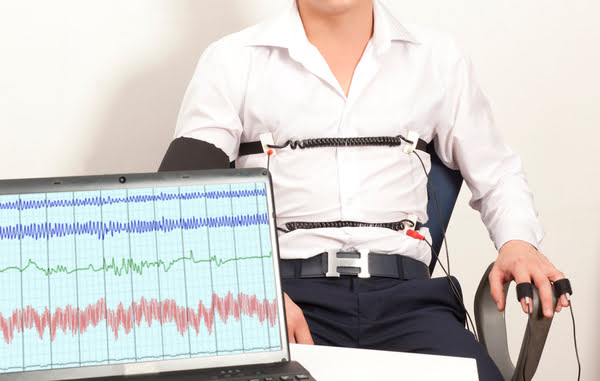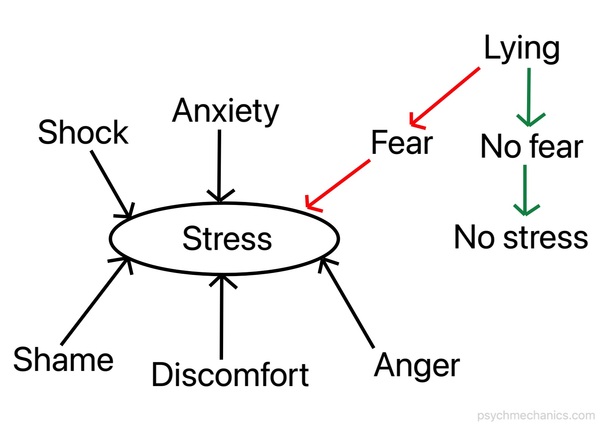A polygraph or a lie detector test is a device that supposedly detects lies. ‘Poly’ means ‘many’, and ‘graph’ means ‘to write or record’. The device has many sensors that record a person’s physiological responses, such as:
- Heart rate
- Blood pressure
- Respiration rate
- Skin conductivity (sweating)
A marked increase in the above measures indicates sympathetic nervous system arousal, a more technical term for stress response.

The idea behind how polygraphs work is that people are likely to be stressed when they lie. The stress registers on the polygraph, and deception is detected.
Therein lies the problem with polygraphs. They’re supposed to work based on two faulty assumptions:
- Stress is always caused by lying
- Liars are always stressed when they lie
In Statistics, these are called errors of measurement. There are two types:
- False positive (Observing an effect where there is none)
- False negative (Not observing an effect where there is one)
When applied to polygraph testing, this means a person who’s not lying may fail the test (false positive), and a guilty, lying person may pass the test (false negative).
Polygraphs are stress detectors, not lie detectors. The leap from ‘being stressed’ to ‘lying’ is enormous and unwarranted. Hence, polygraph tests are not accurate. Sometimes they’ll detect a lie, and sometimes they won’t.
Truths and lies can have life-changing consequences for people. It’s too serious a matter to be left to a 50-50 chance, as polygraphs do.
Why innocents fail the polygraph test
There are several reasons behind failing a polygraph despite telling the truth. All of them revolve around polygraphs being stress, not lie, detectors. Think about the reasons that might stress a person out during a polygraph test. Those are the factors that are likely to produce false positives.
Here are some:
1. Anxiety and nervousness
You’re made to sit in a chair by an authority figure, wires and tubes attached to your body. Your fate is about to be decided by a silly machine that was probably a brainchild of some failed scientist desperate to make an impact on the world.
How can you not be anxious in such a situation?
Lie detection by polygraphs is a stressful procedure in and of itself.
The stress experienced by an innocent person may be due to the procedure itself and not because they’re lying.
There’s this case of an innocent guy who first failed and passed the test the second time. He gave the same answers both times.
He probably failed the first time due to the anxiety caused by the novelty of the situation. When attempting the test the second time, his body was more relaxed. There was more familiarity.
Another big reason for nervousness could be the fear of failing the test. Many people know that lie detectors can be inaccurate. There’s uncertainty attached to the machine.
It’s not like a thermometer that’ll give you precise temperature measurements. It’s this mysterious box from hell that can accuse you of being a liar out of the blue.
2. Shock and sadness
Being accused of a crime you didn’t commit can put anyone in shock. It gets worse when you’re accused by a loved one, someone you trusted. The stress detected by a polygraph may stem from the sadness and shock of being accused of a heinous crime.
3. Embarrassment and shame
Being accused of a heinous crime is embarrassing and shame-inducing. These emotions can also trigger a stress response.
Some people may feel embarrassment or guilt at the mere mention of crimes, even if they did not commit them. Just as you feel stressed when watching negative news.
4. Trying hard not to fail
You may think of ways to pass the test if you’re innocent. You may have done some research on the topic.
The problem is: Trying too hard creates stress.
So, if you’re trying too hard to relax your body or think positive things during the test, that might have an opposite effect.
5. Over-thinking and over-analyzing
We may not notice it in our day-to-day lives, but mental stress gets reflected in the body.
If you overthink and overanalyze the questions you’re asked, that can get registered on a polygraph. Even not understanding a question can induce mental stress.
Even something trivial such as the examiner having difficult-to-understand accent can stress you out as well.
6. Physical discomfort
Like mental discomfort, physical discomfort also leads to a stress response in the body. Maybe the chair you’re in is uncomfortable. The wires and tubes attached to your body may be irritating you.
7. Memories and associations
So far, we’ve been talking about the external triggers of stress. There are internal triggers as well.
Maybe mentioning a crime reminds you of a similar crime you witnessed or watched in a movie. Maybe a question triggers memories of unpleasant past events.
Maybe the person asking you questions resembles a teacher who punished you in school. The possibilities are endless.
8. Anger and rage
If you’re innocent, some accusatory questions may trigger anger or rage in you.

False negatives
Guilty people can pass the lie detector test simply because they’re more relaxed. Similarly, psychopaths, sociopaths, and pathological liars may lie without feeling a pang of stress.
You can beat a polygraph by training yourself psychologically or by using drugs.
